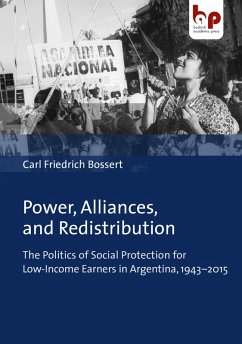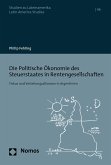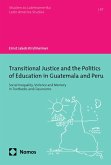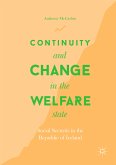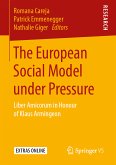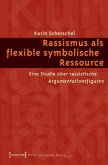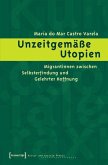Power, Alliances, and Redistribution (eBook, PDF)
The Politics of Social Protection for Low-Income Earners in Argentina, 1943-2015


Alle Infos zum eBook verschenken

Power, Alliances, and Redistribution (eBook, PDF)
The Politics of Social Protection for Low-Income Earners in Argentina, 1943-2015
- Format: PDF
- Merkliste
- Auf die Merkliste
- Bewerten Bewerten
- Teilen
- Produkt teilen
- Produkterinnerung
- Produkterinnerung

Hier können Sie sich einloggen

Bitte loggen Sie sich zunächst in Ihr Kundenkonto ein oder registrieren Sie sich bei bücher.de, um das eBook-Abo tolino select nutzen zu können.
Latin America is considered the most unequal continent in the world. Paradoxically, the development of resource-intensive social systems has done little to change the social imbalance. The author traces this paradox using Argentina as an example, uncovering the underlying conflicts of power and interests, and identifying successful strategies for implementing inclusive policies. As the first study of its kind, it systematically examines the long-term development of social security for low-income earners in Argentina and analyzes the decisive political, social, and economic factors influencing it.…mehr
- Geräte: PC
- ohne Kopierschutz
- eBook Hilfe
- Größe: 22.67MB
- FamilySharing(5)
![Die Politische Ökonomie des Steuerstaates in Rentengesellschaften (eBook, PDF) Die Politische Ökonomie des Steuerstaates in Rentengesellschaften (eBook, PDF)]() Philip FehlingDie Politische Ökonomie des Steuerstaates in Rentengesellschaften (eBook, PDF)0,00 €
Philip FehlingDie Politische Ökonomie des Steuerstaates in Rentengesellschaften (eBook, PDF)0,00 €![Transitional Justice and the Politics of Education in Guatemala and Peru (eBook, PDF) Transitional Justice and the Politics of Education in Guatemala and Peru (eBook, PDF)]() Ernst Jakob KirchheimerTransitional Justice and the Politics of Education in Guatemala and Peru (eBook, PDF)109,00 €
Ernst Jakob KirchheimerTransitional Justice and the Politics of Education in Guatemala and Peru (eBook, PDF)109,00 €![Continuity and Change in the Welfare State (eBook, PDF) Continuity and Change in the Welfare State (eBook, PDF)]() Anthony McCashinContinuity and Change in the Welfare State (eBook, PDF)57,95 €
Anthony McCashinContinuity and Change in the Welfare State (eBook, PDF)57,95 €![Cruel, Inhuman or Degrading Treatment? (eBook, PDF) Cruel, Inhuman or Degrading Treatment? (eBook, PDF)]() Michael AdlerCruel, Inhuman or Degrading Treatment? (eBook, PDF)40,95 €
Michael AdlerCruel, Inhuman or Degrading Treatment? (eBook, PDF)40,95 €![The European Social Model under Pressure (eBook, PDF) The European Social Model under Pressure (eBook, PDF)]() The European Social Model under Pressure (eBook, PDF)73,95 €
The European Social Model under Pressure (eBook, PDF)73,95 €![Rassismus als flexible symbolische Ressource (eBook, PDF) Rassismus als flexible symbolische Ressource (eBook, PDF)]() Karin ScherschelRassismus als flexible symbolische Ressource (eBook, PDF)0,00 €
Karin ScherschelRassismus als flexible symbolische Ressource (eBook, PDF)0,00 €![Unzeitgemäße Utopien (eBook, PDF) Unzeitgemäße Utopien (eBook, PDF)]() María Do Mar Castro VarelaUnzeitgemäße Utopien (eBook, PDF)0,00 €
María Do Mar Castro VarelaUnzeitgemäße Utopien (eBook, PDF)0,00 €-
-
-
Dieser Download kann aus rechtlichen Gründen nur mit Rechnungsadresse in A, B, BG, CY, CZ, D, DK, EW, E, FIN, F, GR, H, IRL, I, LT, L, LR, M, NL, PL, P, R, S, SLO, SK ausgeliefert werden.
- Produktdetails
- Verlag: Budrich Academic Press
- Seitenzahl: 373
- Erscheinungstermin: 19. April 2021
- Englisch
- ISBN-13: 9783966659987
- Artikelnr.: 61617415
- Verlag: Budrich Academic Press
- Seitenzahl: 373
- Erscheinungstermin: 19. April 2021
- Englisch
- ISBN-13: 9783966659987
- Artikelnr.: 61617415
- Herstellerkennzeichnung Die Herstellerinformationen sind derzeit nicht verfügbar.
2. THEORIZING THE POLITICS OF SOCIAL PROTECTION FOR LOW-INCOME EARNERS IN LATIN AMERICA
2.1. Review: Welfare State Theory and Social Protection for Low-Income Earners
2.2. Theoretical Framework
2.2.1. The Power Resources Approach and Latin America: Strengths, Weaknesses and Promising Modifications
2.2.2. The Main Argument: Power Resources and Governing Alliances
2.2.3. Understanding the Role of Different Actors: An Analytical Framework
2.2.4. The Role of Different Actors: Hypotheses
2.2.5. (Re-)Conceptualizing Popular Class Power in Social Policy-Making: Associational, Structural, Institutional, and Discursive Power Resources
3. METHODOLOGICAL APPROACH
4. THE POLITICS OF SOCIAL PROTECTION FOR LOW-INCOME EARNERS
IN ARGENTINA, 1943-2015
4.1. Historical Background and Social Policy before 1943
4.2. Popular Class Incorporation and Social Policy Expansion, 1943-1955
4.3. Military Interventions, Exclusionary Governing Alliances,
and Regressive Social Policy Reform, 1955-1973
4.4. Social Policy Expansion and Political Conflict
during the Second Peronism, 1973-1976
4.5. The Retrenchment of Social Policy under a
Neoliberal Dictatorship, 1976-1983
4.6. Return to Democracy, Stagflation, and the Failed Attempt of Inclusionary Social Policy, 1983-1989
4.7. Neoliberalism and Regressive Social Policy Reform, 1989-2001
4.8. Crisis, Paradigm Change and the Expansion of Social Protections for Low-Income Earners, 2002-2015
4.9. Outlook: The Formation of a New Regressive Governing Alliance and the Return of Retrenchment after 2015
5. ANALYSING THE STRUCTURAL BASES, ACTORS AND POLITICAL MECHANISMS OF CHANGE
5.1. Social Policy towards Low-Income Earners during Different Periods: Between Truncated and Inclusionary Social Protection
5.2. Constellations of Actors and Interests in the Argentine Politics of Social Protection for Low-Income Earners
5.3. The Distribution of Power Resources and Social Protection for Low-Income Earners
5.4. Governing Alliances and Social Protection for Low-Income Earners
6. CONCLUSIONS
2. THEORIZING THE POLITICS OF SOCIAL PROTECTION FOR LOW-INCOME EARNERS IN LATIN AMERICA
2.1. Review: Welfare State Theory and Social Protection for Low-Income Earners
2.2. Theoretical Framework
2.2.1. The Power Resources Approach and Latin America: Strengths, Weaknesses and Promising Modifications
2.2.2. The Main Argument: Power Resources and Governing Alliances
2.2.3. Understanding the Role of Different Actors: An Analytical Framework
2.2.4. The Role of Different Actors: Hypotheses
2.2.5. (Re-)Conceptualizing Popular Class Power in Social Policy-Making: Associational, Structural, Institutional, and Discursive Power Resources
3. METHODOLOGICAL APPROACH
4. THE POLITICS OF SOCIAL PROTECTION FOR LOW-INCOME EARNERS
IN ARGENTINA, 1943-2015
4.1. Historical Background and Social Policy before 1943
4.2. Popular Class Incorporation and Social Policy Expansion, 1943-1955
4.3. Military Interventions, Exclusionary Governing Alliances,
and Regressive Social Policy Reform, 1955-1973
4.4. Social Policy Expansion and Political Conflict
during the Second Peronism, 1973-1976
4.5. The Retrenchment of Social Policy under a
Neoliberal Dictatorship, 1976-1983
4.6. Return to Democracy, Stagflation, and the Failed Attempt of Inclusionary Social Policy, 1983-1989
4.7. Neoliberalism and Regressive Social Policy Reform, 1989-2001
4.8. Crisis, Paradigm Change and the Expansion of Social Protections for Low-Income Earners, 2002-2015
4.9. Outlook: The Formation of a New Regressive Governing Alliance and the Return of Retrenchment after 2015
5. ANALYSING THE STRUCTURAL BASES, ACTORS AND POLITICAL MECHANISMS OF CHANGE
5.1. Social Policy towards Low-Income Earners during Different Periods: Between Truncated and Inclusionary Social Protection
5.2. Constellations of Actors and Interests in the Argentine Politics of Social Protection for Low-Income Earners
5.3. The Distribution of Power Resources and Social Protection for Low-Income Earners
5.4. Governing Alliances and Social Protection for Low-Income Earners
6. CONCLUSIONS
